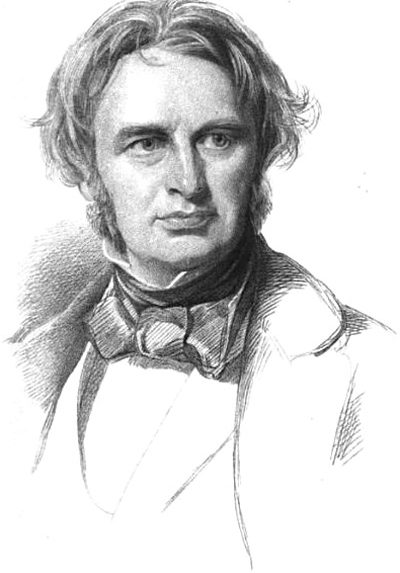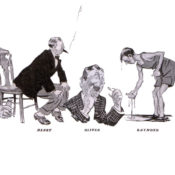“Henry Wadsworth Longfellow… could sing. He could tell stories about America. Maybe his form were imported, but they were tempered and transformed by his fantastic world.”
So writes Michael Schmidt in his Lives of the Poets (Alfred A. Knopf, New York, 1999, pp. 436-438.)
“For him the language of verse was an aloud language, and sound counted as much as — or more than — sense. In the toils of sound he sails near to nonsense — too near, perhaps.
“Yet also in the toils of sound he will… break the rules of his chosen prosodies… when his ear tells him to. He privileges his ear over the form, and some of his finest prosodic effects are in the unexpected variations that possess an inexplicable rightness.”
Hymn To The Night
I heard the trailing garments of the Night
Sweep through her marble halls!
I saw her sable skirts all fringed with light
From celestial walls!
I felt her presence, by its spell of might
Stop over me from above:
The calm, majestic presence of the Night,
As of the one I love.
I heard the sounds of sorrow and delight,
The manifold, soft chimes,
That fill the haunted chambers of the Night
Like some old poet’s rhymes.
From the cool cisterns of the midnight air
My spirit drank repose;
The fountain of perpetual peace flows there,
From those deep cisterns flows.
O holy Night! from thee I learn to bear
What man has borne before!
Thou layest thy finger on the lips of Care
And they complain no more.
Peace! Peace! Orestes-like I breath this prayer!
Descend with broad-winged flight,
The welcome, the thrice-prayed for, the most fair,
The best-beloved Night!
The Evening Star
The night is come, but not too soon;
And sinking silently —
All silently, the little moon
Drops down behind the sky.
There is no light in earth or heaven
But the cold light of stars;
And the first watch of night is given
To the red planet Mars.
Is it the tender star of love?
The star of love and dreams?
O no! from that blue tent above,
A hero’s armor gleams.
And earnest thoughts within me rise,
When I behold afar,
Suspended in the evening skies,
The shield of that red star.
O star of strength! I see thee stand
And smile upon my pain;
Thou beckonest with thy mailed hand,
And I am strong again.
Within my breast there is no light
But the cold light of stars;
I give the first watch of the night
To the red planet Mars.
The star of the unconquered will,
He rises in my breast,
Serene, and resolute, and still,
And calm, and self-possessed.
And thou, too, whosoe’er thou art,
That readest this brief psalm,
As one by one thy hopes depart,
Be resolute and calm.
O fear not in a world like this,
And thou shalt know erelong,
Know how sublime a thing it is
To suffer and be strong.
Autumn
With what a glory comes and goes the year!
The buds of spring, those beautiful harbingers
Of sunny skies and cloudless times, enjoy
Life’s newness, and earth’s garniture spread out;
And when the silver habit of the clouds
Comes down upon the autumn sun, and with
A sober gladness the old year takes up
His bright inheritance of golden fruits,
A pomp and pageant fill the splendid scene.
There is a beautiful spirit breathing now
Its mellow richness on the clustered trees,
And, from a beaker full of richest dyes,
Pouring new glory on the autumn woods,
And dipping in warm light the pillared clouds.
Morn on the mountain, like a summer bird,
Lifts up her purple wing, and in the vales
The gentle wind, a sweet and passionate wooer,
Kisses the blushing leaf, and stirs up life
Within the solemn woods of ash deep-crimsoned,
And silver beech, and maple yellow-leaved,
Where Autumn, like a faint old man, sits down
By the wayside a-weary. Through the trees
The golden robin moves. The purple finch,
That on wild cherry and red cedar feeds,
A winter bird, comes with its plaintive whistle,
And pecks by the witch-hazel, whilst aloud
From cottage roofs the warbling bluebird sings,
And merrily, with oft-repeated stroke,
Sounds from the threshing-floor the busy flail.
Oh, what a glory doth this world put on
For him who, with a fervent heart, goes forth
Under the bright and glorious sky, and looks
On duties well performed, and days well spent!
For him the wind, ay, and the yellow leaves,
Shall have a voice, and give him eloquent teachings.
He shall so hear the solemn hymn that Death
Has lifted up for all, that he shall go
To his long resting-place without a tear.
The Arrow And the Song
I shot the arrow in the air,
It fell to earth, I knew not where;
For, so swiftly it flew, the sight
Could not follow it in its flight.
I breathed a song into the air,
It fell to earth, I knew not where;
For who has sight so keen and strong,
That it can follow the flight of song?
Long, long afterward, in an oak
I found the arrow, still unbroke;
And the song, from beginning to end,
I found again in the heart of a friend.
Become a Saturday Evening Post member and enjoy unlimited access. Subscribe now



